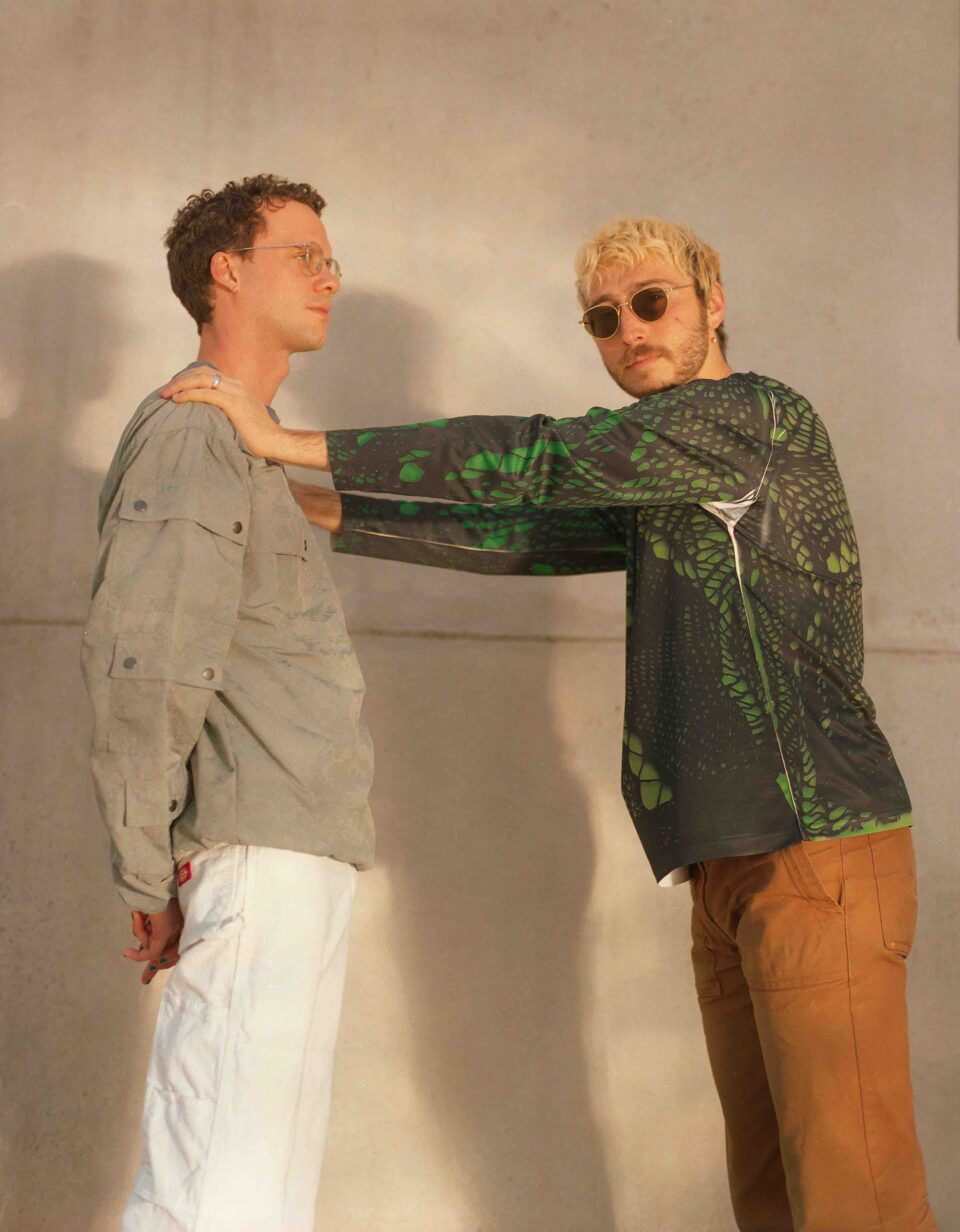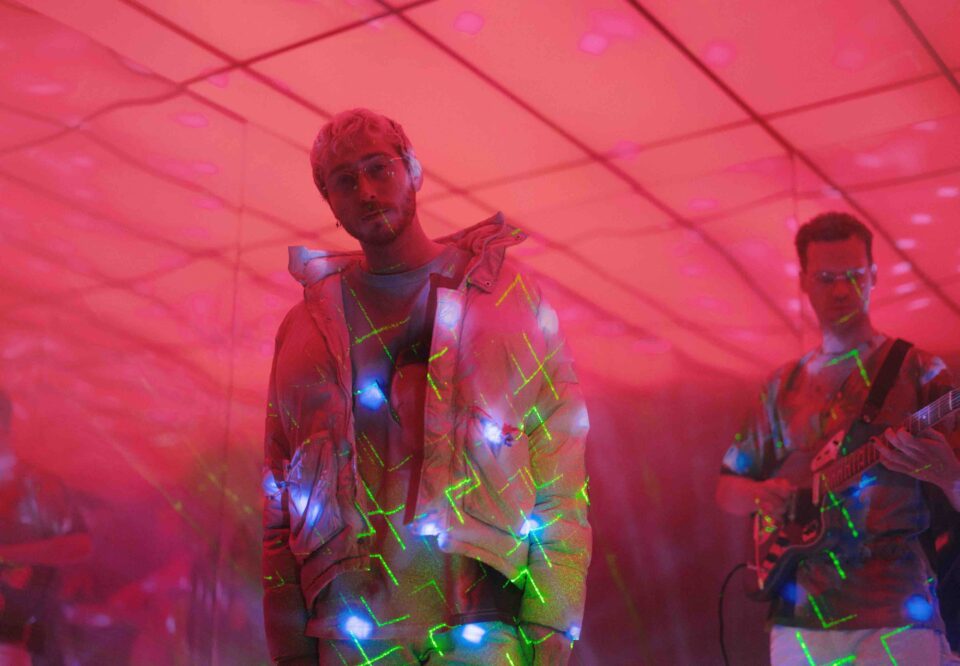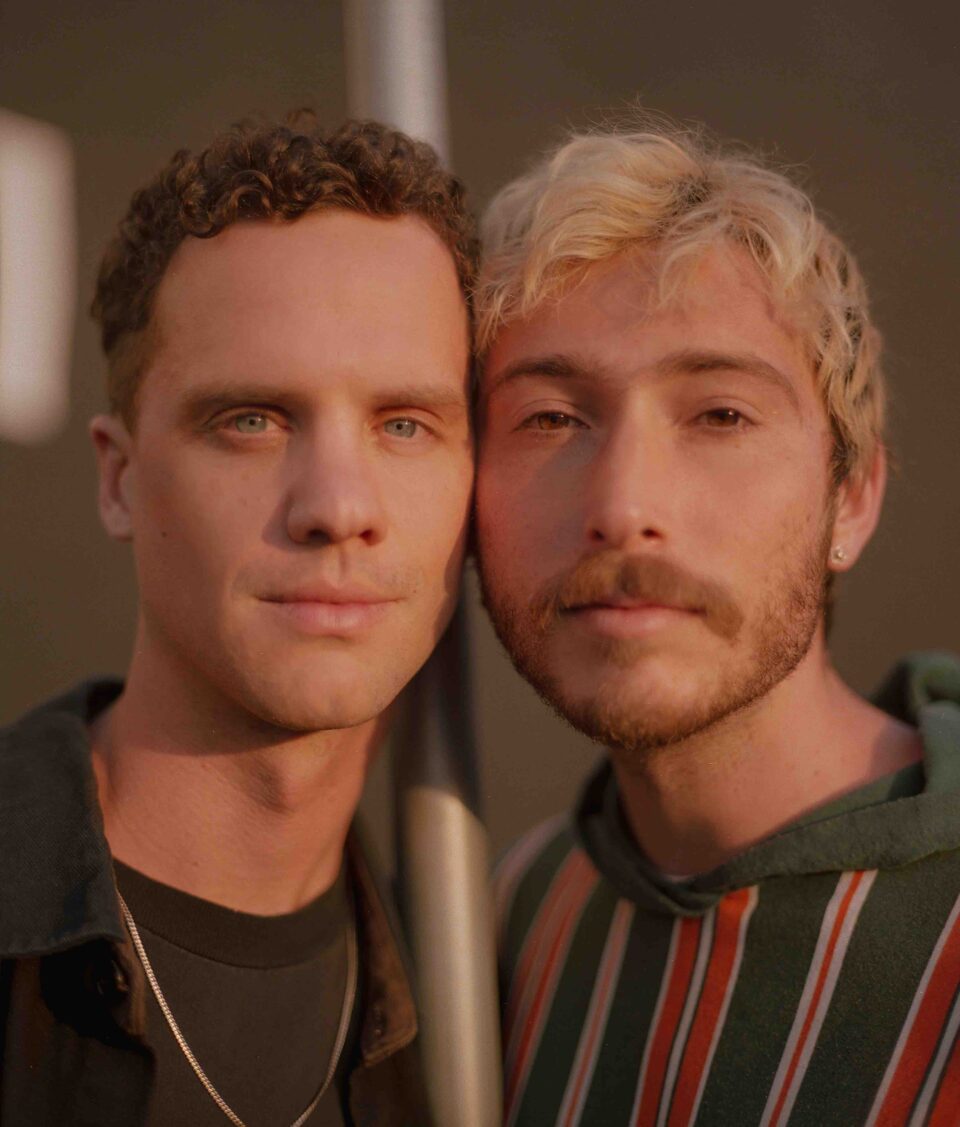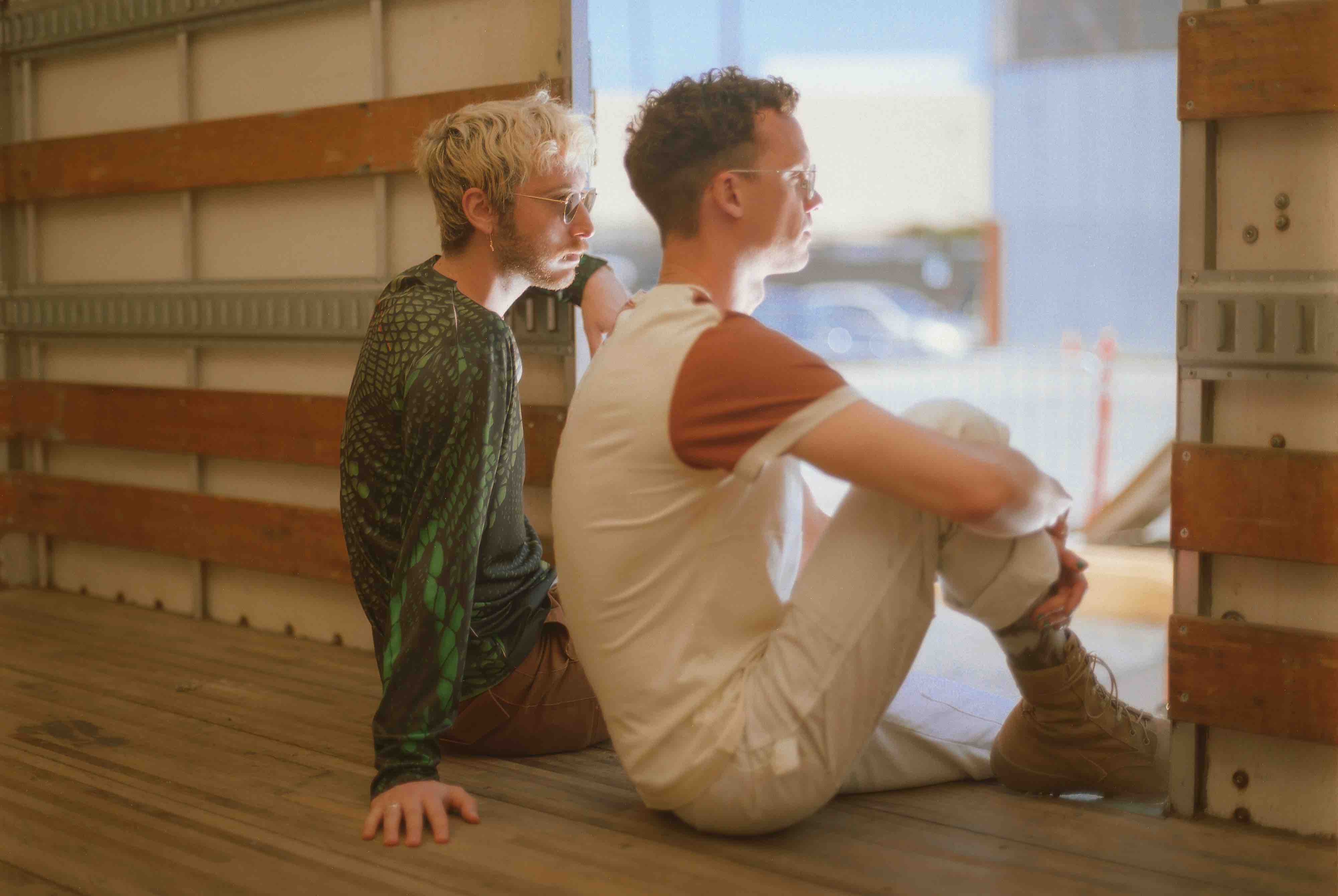It’s hard to pinpoint exactly where Smith Westerns ended and Whitney began. The former, originally comprising Omori brothers Cullen and Cameron and guitarist Max Kakacek, found themselves a T. Rex resplendent with the glam of contemporary neo-psychedelia and moxie of bubblegum garage at the onset of the 2010s. With a critically acclaimed sophomore album in tow, and Unknown Mortal Orchestra’s Julien Ehrlich replacing original drummer Hal James, the ceiling seemed as far away as ever.
But eventually came a break-up after Kakacek left the band in 2014. Soon after, a priceless musical alchemy arose from the ashes: the collaborative bond between Kakacek and Ehrlich, who, six months to a year after the dissolution of Smith Westerns, would form Whitney and start writing the songs that would make up their debut LP, Light Upon the Lake. “I remember Cullen and Cameron coming over, and we’d written ‘Dave’s Song,’ which we kind of wrote as a joke—we were like, ‘Oh, check out this funny thing that we made.’,” Ehrlich says. “The ending was a little bit blurry because we didn’t necessarily know we were starting Whitney when we started Whitney.”
As good as Smith Westerns were, no one could have foreseen how great Whitney would become. Light Upon the Lake placed the band firmly within the echelons of folk-heavy American pop—though none of their albums have ever firmly belonged in any sort of box. The blueprint on their first record proved perfect, at least for the moment at which it arrived. Ehrlich’s smooth falsetto, an antithesis of Levon Helm’s rugged bravado, became Whitney’s hallmark. His splay of vocals across arrangements flush with a contouring melancholy warmth were met with Kakacek’s slick and patient guitar work. The horns, strings, and percussion on tracks like “Golden Days” and “No Matter Where We Go,” along with Jonathan Rado’s production, showcased what so very few bands possess: A fully realized sound from the jump.
“The ending [of Smith Westerns] was a little bit blurry because we didn’t necessarily know we were starting Whitney when we started Whitney.”
— Julien Ehrlich
When their sophomoric record Forever Turned Around followed three years later, it was a gentle detour from its predecessor, swapping Kakacek’s blistering, hooky foreground solos for a soft, orchestral expansion of guitars and keys. The album was much more of a slow-burn, as it honed a catchy, mid-’70s soft rock pastiche, but the effect rendered the same. Production setbacks, along with a rigorous touring schedule, turned the rollout process for Forever Turned Around into a mixed bag. But if you’ve ever attended a Whitney show, you’d never know that Ehrlich and Kakeck were not initially all-in on the record—the electricity of “Giving Up,” the balladeering heavy-heartedness of “Used to Be Lonely,” and the golden hour, breezing ensemble of “Rhododendron” flicker when protracted into an eight-piece sound beneath stage lights.
But now, three years removed from its release, Whitney are opening their hearts wider to Forever Turned Around. “I have nights when I can’t sleep and, just feeling nostalgic, I’ll go back and listen to Forever Turned Around and feel so connected to it and so proud of it,” Ehrlich says. “It felt like a bit of an ugly duckling when we were making it, but I think that record gets more beautiful as we grow further apart from it.”

photo courtesy of the artist
When the pandemic hit, Kakacek and Ehrlich were “spiritually ready” to take a break from touring and make a new record. Trading between stints at their Chicago ad hoc studio and a Craigslist bungalow they rented in Portland, Oregon, Whitney began compiling the stems of their third LP of original material, SPARK—an ethereal and daring rewrite of the band’s formula. After two albums that pigeonholed Whitney into—as critics called it—a “dependable” sound, they’ve obliterated their own box in favor of a widening habitat of lush electronic soundscapes with the occasional, meticulously timed glam curve. “While we were confused and scared, we were also like, ‘Well, we know what to do,’” Ehrlich says. “We were ready to hit the ground running.”
“There definitely was an element of ‘do or die’ with this record. It felt like the bar was randomly set really high, as far as what we’re writing and the quality of it in our eyes.”
— Julien Ehrlich
When they started demoing in the studio, the duo immediately gravitated toward drum samples and pulling chords from keyboards as recording bases, as opposed to the motions they ran through on Forever Turned Around and Candid, the latter a covers album released in the early throes of COVID-19. “After making Candid, without even expressing it to each other, I think we knew that we had exhausted some part of our brains and [were] really leaning into everything being based around acoustic, organic performances, at least from a creative standpoint,” Kakacek adds.
In the past, Kakacek and Ehrlich would have their string-playing friends come by their house and demo all their parts, but quarantine proved that to be impossible. As a result, the guys narrowed their own ecosystem by adopting padded sounds instead of string arrangements and introducing more Mellotron runs into their instrumental toolbox. Despite jumping through COVID-induced hoops, the transition came naturally. The first song Ehrlich wrote was “NOTHING REMAINS,” which, fittingly, opens SPARK and christens a new era. “As soon as we sat down to try to record it, Max chose the right breakbeat off the bat and it felt like honest discovery and exploration,” he adds. “We sent it to Brad Cook, who we’ve worked with before, just to get feedback. And his feedback was, immediately, ‘This is the best song you guys have ever made,’ which was really encouraging.”
Though the pandemic has warped everyone’s sense of time, the three years separating Forever Turned Around and SPARK is the same amount of time Whitney took to follow-up Light Upon the Lake. External pressures from fans wanting new music, or industry heads yearning for a peek at their next chapter, didn’t weigh on the band as much as their own expectations. “It’s always been the case that we’ve put the most pressure on ourselves,” Ehrlich says. “But we’re really inspired by each other, too. The feeling was there, spiritually, and the material was there. There definitely was an element of ‘do or die’ with this record, though. It felt like the bar was randomly set really high, as far as what we’re writing and the quality of it in our eyes.”
Kakacek likens the songwriting process of SPARK to that of Lake, given how the songs had the space to grow on their own and how, even though the band’s quest of making a caliber record is on an even higher pedestal now than it was in 2019, they didn’t feel rushed to finish any of the compositions. “Things organically popped up and then clicked immediately, even in the recording process,” he says. “From an idea’s inception to the final thing, it was pretty streamlined and efficient.” Contrasting with Forever Turned Around, the band’s resources then restricted the kind of pace the band is working at now, and their creative language has progressed. Even “BLUE,” which begins by sounding like something that would’ve fit nicely on the back-half of Candid, eventually flourishes as a digitized new model with a kaleidoscopic melody.
“With Forever Turned Around, nothing was ever good enough until it was done. Now that we’re both separated [from the album] by a couple of years, we’re like, ‘Man, I’m glad I put the time into those little moments, because now they actually matter.’”
— Max Kakacek
“With Forever Turned Around, nothing was ever good enough until it was done,” says Kakacek. “We were really in our heads about everything having to be perfect. There’s this attention to small detail that I think drove us a little bit crazy. Now that we’re both separated [from the album] by a couple of years, we’re like, ‘Man, I’m glad I put the time into those little moments, because now they actually matter.’”
With a sonic topography now boundless, Whitney finds themselves in what they consider a “no rules situation.” From the Eno-esque synths on “TWIRL,” to the Dilla-citing beats on “REAL LOVE,” to the hollow, atmospheric ether of “COUNTY LINES,” the band pays empathetic homage to the sounds they grew up adoring. “Julien and I have been playing music together for 10 years now, and also been listening to music for the same amount of time, and I think we always start by trying to find the catchiest melody,” Kakecek says. “Even in Light Upon the Lake, everything is catchy, at least in our heads. We were trying to achieve something catchy, constantly, and the same thing with all of the music we’ve made.”

photo courtesy of the artist
As the duo pivots toward another tour and, eventually, another record, they’ve got sights set on letting their influences continue to grow. The newest idea they’ve been working on merges elements of The Band and Ariana Grande. “I think we’re not afraid to embrace the things that we truly love,” Ehrlich adds. “I genuinely love Coldplay.”
After “playing it safe” on Forever Turned Around, no one was expecting Whitney to return with a sound as prismatic as the one living on SPARK—except for Whitney. It’s a testament to their music-making, which was top drawer from the jump. What comes next is unspoken for now, but the band has the means to translate each of their ideas into whatever shape they demand to take. “It’s a song-by-song basis, and I think SPARK widened our vocabulary in a very specific way that, looking at everything we’ve made and achieved, sonically, and the diversity that we have now in our wheelhouse to toy with, is the most inspiring part,” Kakacek says.
“I think SPARK widened our vocabulary in a very specific way that, looking at everything we’ve made and achieved, sonically, and the diversity that we have now in our wheelhouse to toy with, is the most inspiring part.”
— Max Kakacek
Of course, Kakacek and Ehrlich have worked hard to become the Chicago legends they are. You don’t get your own holiday without first doing something singular enough to warrant such an honor. They’ve captivated audiences with a short but unrelenting discography and an expansive, flawless live persona. On this year’s “Whitney Day” in their hometown, the sun stretched far across Lake Michigan and the Navy Pier ferris wheel felt especially otherworldly as it climbed upward into the Midwestern sky. It conjured a similar feeling as listening to SPARK for the first time in its entirety does.
Before and during the making of the record, the guys each went through a breakup and lost loved ones to COVID-19. In turn, what they’ve made is a solemn testimony of longing and grief. But what’s true beyond the music holds court on SPARK: Kakacek and Ehrlich have a partnership that will shoulder them across whatever lies before them. “[SPARK] was the biggest test of trust,” Kakacek says. “When we went into recording this new idea, everyone was supportive of that. We were pretty fearless with it internally, but I don’t think we could have decided to make such a big change without having someone else to lean on.” FL

photo by Tonje Thilesen







